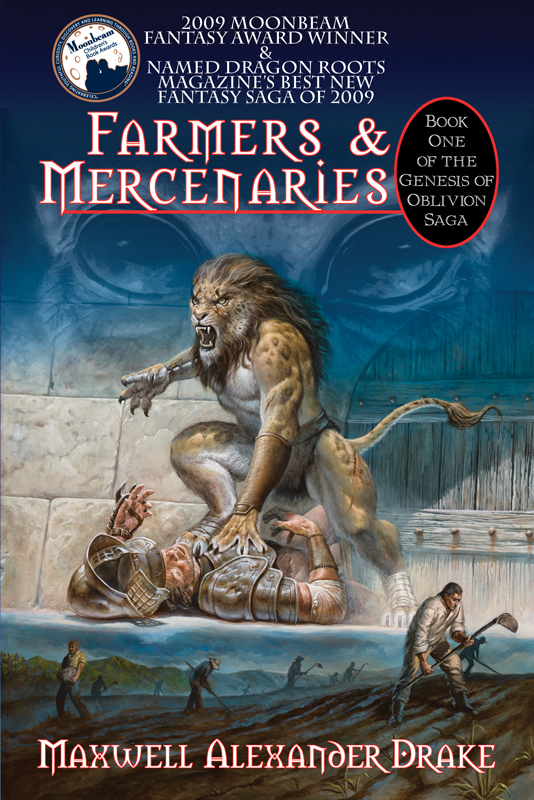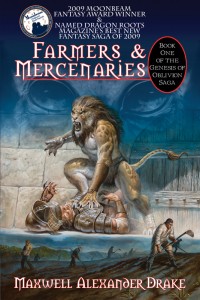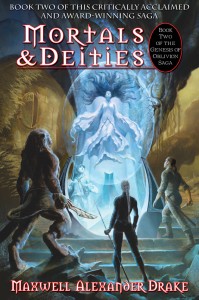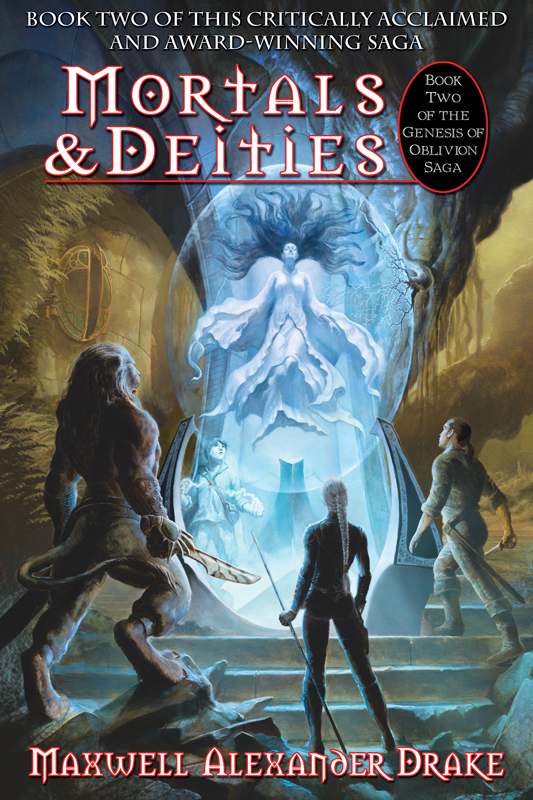The Genesis of Oblivion Saga: Famers and Mercenaries and Deities and Mortals
Craven Games will probably not review too much fantasy fiction in the future (unless it relates to gaming), but at the same time, I do want to bring attention to a great Las Vegas Valley writer, Maxwell Alexander Drake. If you’re saying “Who?”, then read on, this review and overview is for you. My interview with him will be posted shortly.
Nix is no, morns are mornings, eves are evenings, drakons are dragons, aurns are hours, Southron is Southern and on it goes. Add in a couple dozen apostrophized words like Chand’lean, Hild’alan, and Hath’oolan and the opening chapters of Famers & Mercenaries can be hard going. Author Maxwell Alexander Drake front-loads the first book in his Genesis of Oblivion Saga with strange terms. Once I made it through the first several chapters though, I found myself quite immersed in his riveting story.
What makes Farmers and Mercenaries so immersive is that instead of a single stranger in a strange land with whom the reader might identify, Drake provides three. There is the farm boy Arderi Cor who finds himself plunged into adventure, his older brother Alant Cor visiting the mysterious island of Elmoreth for the first time, and the Kith slave Klain, who is thrust into a life as a gladiator and is the cat person depicted on the cover. All three of these characters also bristle with unrecognized power and potential, which is very appealing to both adolescent males and ones in their thirties. There is only one voice of experience, Clytus Rillion, the Obi Wan Kenobi of the Farmers and Mercenaries heroic journey. Joseph Campbell’s theory weighs heavily on Drake’s writing, to good effect.
As a writer Drake is strongest in the page-turning elements of plot. His storytelling goes beyond foreshadowing, encouraging the reader to make predictions and then usually fulfilling them. The reader can appreciate small dramatic ironies throughout Drake’s series of books, which switch back and forth from character’s perspectives. Drake’s characterization and sense of voice for the characters is another strength. There are regional accents and certain characters leap off the page. Like many young adult authors he uses a good deal of repetition to firmly establish his characters and setting. Forgetting who a particular character is or what one of the protagonists is trying to achieve is almost impossible as a consequence. On the other hand, I never found myself marveling over any turn of phrases or enjoying any succinct passages in his books; Drake stays away from poetic prose and writes very directly. There are no undertones of Tolkien in his work.
Also absent are any elves, dwarves, and many other fantasy stereotypes. His continents are populated mostly by humans, either of the Ro’Arith variety or the dark-skinned natives of Sulaway. In the first two books, there are also O’Arkians, brutal mountainous orcs of some variety, the afore-mentioned Kithian cat people, and the skinny large headed Elmorethians, masters of the Essence. The Essence is magic, to be sure, but there are no wizards or warlocks wandering about in Drake’s world. Shapers of the Essence can enhance objects with strength magically and also mend broken objects, including flesh and bone. The mysterious and deadly Elith, a female character introduced in the second book Mortals and Deities, is a member of a fourth Essence-based race. As for deities, they are worshipped in Temples of the Twelve. Drake is intriguingly vague about the gods, but they are an important aspect of his saga.
Interestingly enough, politics are also left out of the first two books though in his interview with Craven Games, there are hints that this will not always be the case. This is not Songs of Fire and Ice, nor almost any other fantasy series for that matter. There are princes and princesses, but the nations they represent are ill-defined and unimportant thus far in the saga. Instead the battles are oftentimes of a more academically magical and interpersonal nature, though the books definitely have fights. Without spoiling anything, despite the presence of the healing Shapers, Drake’s combats get fatal fast. Several events in both books had me marveling over the rapid plot developments and exclaiming to my wife about what had just happened.
The quality of Drake’s writing and plots is consistently good through both books. Fans of Farmers and Mercenaries will not be let down by Mortals and Deities. In fact, the second book alleviates some of the narrative tension that Drake creates in Farmers and Mercenaries, while creating many new conflicts. Both books end with strong hooks, leaving the reader longing for more, and leaving no doubt that each book is only a small fragment of the larger saga. The thrilling saga picks up again in several months with Dreams and Nightmares.





Pingback:Maxwell Alexander Drake on the Genesis of Oblivion Saga, Musicals, and Graphic Novels | Craven Games: In-Depth Tabletop Games Coverage